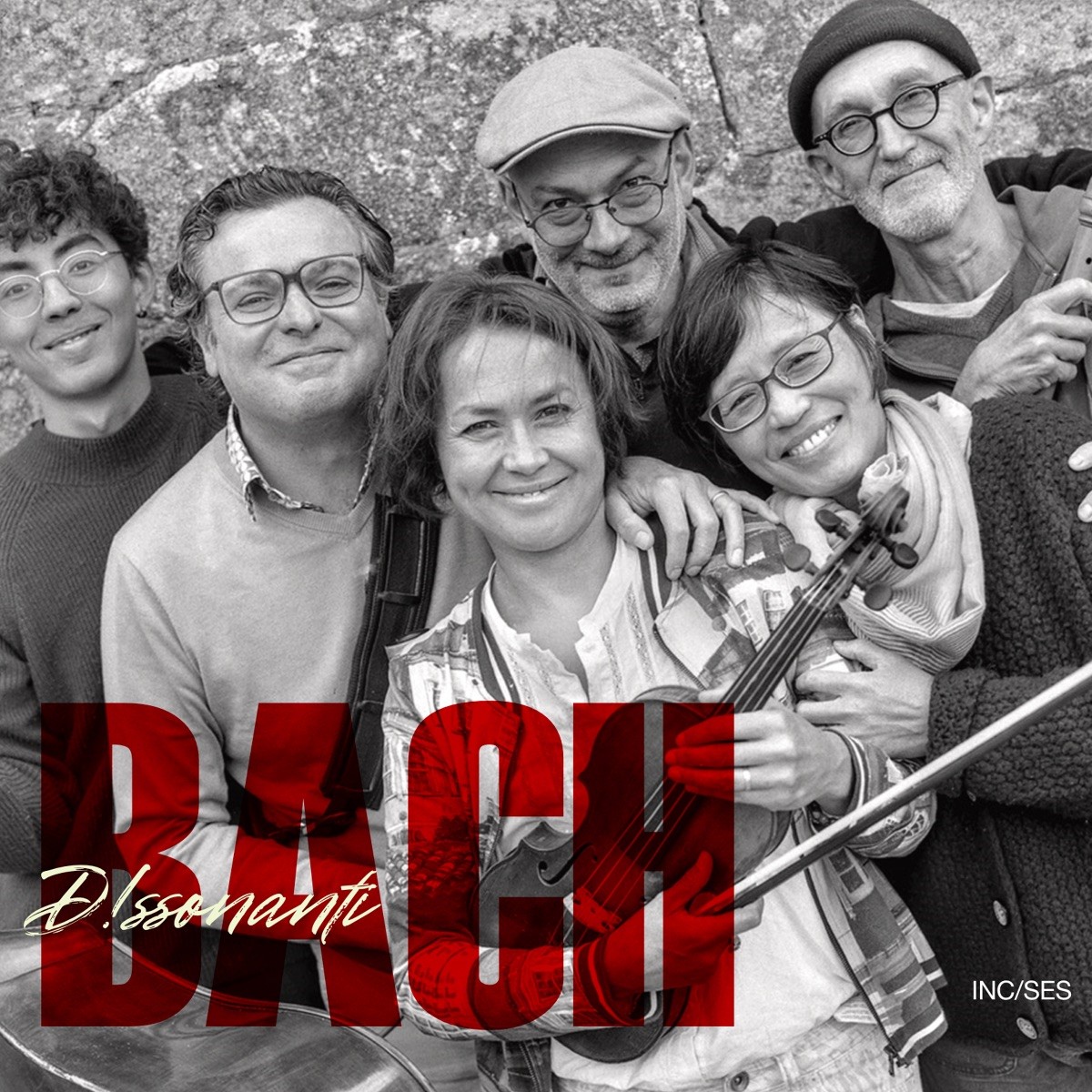BACH D!ssonanti

BACH D!ssonanti
Sébastien Marq, alto recorder (1, 3, 4, 5, 6, 11), voice recorder (8, 9, 10)
Antoine Torunczyk, oboe (1, 2, 4, 5, 11), oboe d'amore (6, 8, 9, 10), oboe da caccia (3)
Tami Troman, violin (1, 2, 3, 4, 5, 6, 11)
Javier Zafra, bassoon (1, 2, 3, 4, 5, 7, 8, 9, 10, 11)
Simon Torunczyk, double bass (1, 2, 3, 4, 5, 11)
Chiaopin Kuo, harpsichord (1, 3, 4, 5, 8, 10, 11)
Armelle Marq, vocals (6, 8, 9, 10)
Recording: Église Notre Dame de la Merci in Trémel / August 2023
Sound recording / Artistic direction / Editing: Franck Jaffrès / Unik Access
Photos : Hervé de Williencourt
1. Praeludium et Fuga (*) BWV 885 (Das Wohltemperierte Clavier II)
2. Nun komm, der Heiden Heiland (**) BWV 659 (Achtzehn Choräle von verschiedener Art)
3. Christ, unser Herr, zum Jordan kam (*) BWV 684 (Clavier-Übung III)
4. Fantasie und Fuge (**) BWV 904
5. Ciaccona (*) - Partita II BWV 1004 (Sei Solo à Violino senza Basso accompagnato)
6. Wo soll ich fliehen hin (*) BWV 646 (Sechs Choräles von verschiedener Art; Schübler-Chorales)
7. Pedal Exercitium (*) BWV 598
8. Schmücke dich o liebe Seele (*) BWV 759
9. Wir Christenleut’ (*) BWV 710
10. Allein Gott in der Höh sei Ehr (*) BWV 676 (Clavier-Übung III) 11 - Passacaglia & Thema fugatum (*) BWV 582
(*) : Arrangement Sébastien Marq
(**) : Arrangement Antoine Torunczyk
J S Bach, Fantasy and Fugue after BWV 904 (arrangement by Antoine Torunczyk)
ABOUT US
(Extract from the libretto - Antoine Torunczyk and Sébastien Marq)
Johann Sebastian Bach never hesitated to adapt, rework and truly metamorphose his own music with remarkable aplomb. There is no shortage of examples: the prelude for solo violin ‘exploded’ into a sinfonia for great organ and an orchestra made up of strings, 2 oboes, 3 trumpets and timpani (! ) in the cantata BWV 29 Wir danken dir, Gott, wir danken dir; the addition of a four-part choir to the opening of the fourth suite for orchestra in the cantata BWV 110 Unser Mund sei voll Lachens; the addition of a left hand to the melody that disrupts the harmony in a quite extraordinary way in the harpsichord adaptation of a partita for solo violin (BWV 968). Bach did not seem to regard his own music as fixed and immutable. But not that of other composers either! Just listen to the fantastic ornaments added to Alessandro Marcello's Oboe Concerto, adapted for the organ by Bach (BWV 974), or the extraordinary viola part transfiguring Pergolesi's Stabat Mater, in its revised version Tilge, Höchster, meine Sünden BWV 1083. This audacity may seem surprising to today's listener, who, in recent decades of historically informed musical practice, has become accustomed to the sacralisation of sources, and to whom it is difficult to accept music in forms other than Urtext. And yet, how can we fail to recognise that Bach did not have our scruples, and that in his mind his work could be totally protean?
It is this model that we have modestly sought to follow in the programme for this disc. But unlike some of our predecessors who have dared, through transcription, to appropriate Bach's music with varying degrees of success (from Brahms to Stokowski, via the Swingle Sisters...), we have tried to do so with freedom, of course, but also with respect. Our instrumentation is quite similar to that used by Bach in his cantatas (think of the cantata Tritt auf die Glaubensbahn BWV 152, apart from the viola d'amore), and each of us has, in the course of a busy life spent in contact with Bach's music played on period instruments and with a concern for authenticity, acquired enough proximity to his musical language to respect, if not the letter, at least the spirit. These years spent close to - and perhaps even close to - his music have stimulated our imagination, and we wanted to hear some of his pieces in a new form, without changing the language.
We know that most of the time, Bach knew the performers for whom he wrote his works - particularly his cantatas - their talent, the possibilities of their instruments and their vocal tessituras. And his loyalty to exceptional musicians such as the oboist Caspar Gleditsch and the trumpeter Gottfried Reiche did not prevent him from writing extraordinary solos for other brilliant visiting musicians: the flutist Pierre-Gabriel Buffardin and the violinist Johann Georg Pisendel, for example. Our transcriptions were also tailor-made for the musicians in our ensemble, who played an active part in their creation during rehearsals and concerts. This long collective process, in which the music never ceases to evolve over time and through the interactions between performers - we can think of other living music traditions closer to home (jazz, for example) - is, we believe, an element that was perhaps not foreign to the practice of the time...
(...)
Johann Sebastian Bach: Chaconne (arrangement by Sébastien Marq)
D!ssonanti
Since 2005, D!ssonanti (formerly known as the Accademia dei Dissonanti) has brought together a group of old hands in the world of early music, each an authority in his or her own field, some of them stalwarts of the most prestigious orchestras (Les Arts Florissants, Pygmalion, Freiburger Barockorchester, Amsterdam Baroque Orchestra, Concerto Copenhagen, etc.). The decades they have spent travelling all over Europe and teaching at some of the greatest conservatoires (Paris, Brussels, The Hague, etc.) have not left them bored, however, and they still get a real kick out of getting together and playing original music written for their instruments, as well as the transcriptions they specialise in. From Charpentier to Vivaldi and Telemann - with Bach as the common thread - their concerts have taken them to France, the Netherlands and Denmark, to major city halls and small country churches, spreading the infectious joy of making music.
More info: https://dissonanti.fr
Share on your networks!
Follow us on the networks!

